Indonesian music, dance spark cultural chemistry
“The same principle applies to our life as well. Our life cannot operate outside the boundary of harmonious existence with others.”
By Joel LeePublished : Sept. 25, 2017 - 17:03
As the hypnotic harmony of percussion instruments rippled throughout the Indonesian Embassy in Seoul on Sept. 17, Indonesian and Korean audiences sat still side by side, thoroughly tuned to the Gamelan music performed in front of them.
The event on the pleasant Sunday afternoon featured performances of Indonesia’s traditional ensemble music Gamelan and lion dance Reog, marking the launch of weekly music classes for students.
“Harmony in Gamelan is created through the disciplined application of each percussion instrument,” said Indonesian Ambassador Umar Hadi in front of some 40 Koreans and other audience members. “The same principle applies to our life as well. Our life cannot operate outside the boundary of harmonious existence with others.”
The event on the pleasant Sunday afternoon featured performances of Indonesia’s traditional ensemble music Gamelan and lion dance Reog, marking the launch of weekly music classes for students.
“Harmony in Gamelan is created through the disciplined application of each percussion instrument,” said Indonesian Ambassador Umar Hadi in front of some 40 Koreans and other audience members. “The same principle applies to our life as well. Our life cannot operate outside the boundary of harmonious existence with others.”
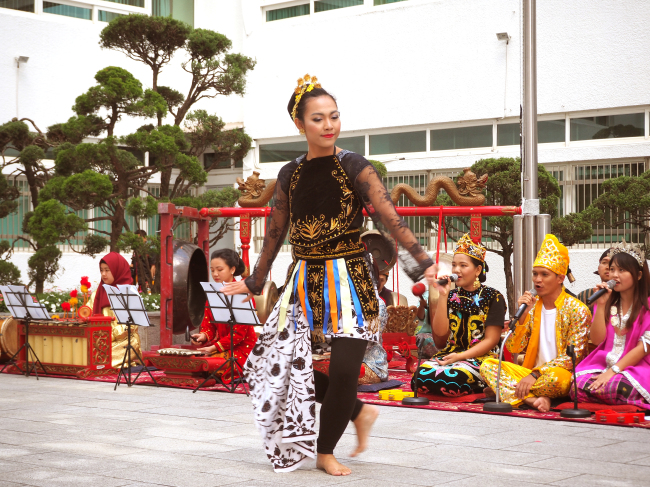
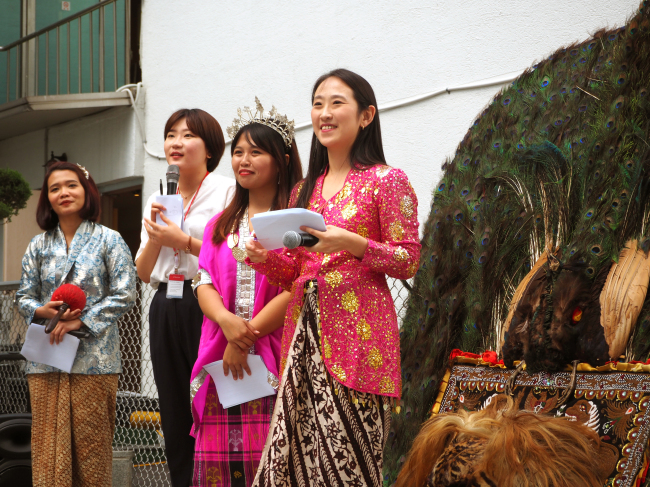
Gamelan is predominantly made up of percussive instruments, including metallophone, kendhang, xylophone, bamboo flute, rebab and sindhen. The music predates the Hindu-Buddhist culture that thrived in Indonesia millennia ago, and developed into the current form during the Majapahit Empire from the late 13th to early 16th century.
In modern times, Gamelan has influenced Western contemporary, romantic, avant-garde and jazz music as well as Japanese contemporary music, leaving its unmistakable melodies in the works of composers Claude Debussy, Erik Satie, Bela Bartok, John Cage, Don Cherry and Ryuichi Sakamoto, among numerous others.
“I have played Gamelan for many years since I was young. Whenever I play the music, I feel replenished and mystified by its soothing sounds,” the envoy said. “Gamelan incorporates many philosophies and traditions of Indonesia, chiefly our national motto ‘unity in diversity.’ There are many varieties of Gamelan in Java, Sumatra and Kalimantan, and even in Java there are many different kinds of Gamelan music.”
Describing his compatriots as a “lucky people” exposed to the country’s sundry musical traditions -- a nation comprised of some 17,000 islands spanning three time zones -- Hadi said, “Our contemporary cultures are becoming more diverse and complex, as cultures merge to create new hybrid cultures. I hope the Korean people’s experience in learning Gamelan would lead to more creative endeavors between our two countries.”
At the venue, Indonesian traditional dance group Kelompok Tari Tradisional Indonesia, Gamelan-performing ensemble Laras Garis and a team of dancers in Korea, Reog Singo Mudho, showcased their music, following a lunch of traditional Indonesian dishes. Laras Garis has Korean players, who use Gamelan instruments owned by the embassy and several Indonesian communities and universities in Korea.
The embassy initially opened one Gamelan class for learners, but due to the surging number of applicants, has decided to offer two classes on Saturday.
Korean students who have studied in Indonesia through the government-sponsored Darmasiswa scholarship program also participated in the event.

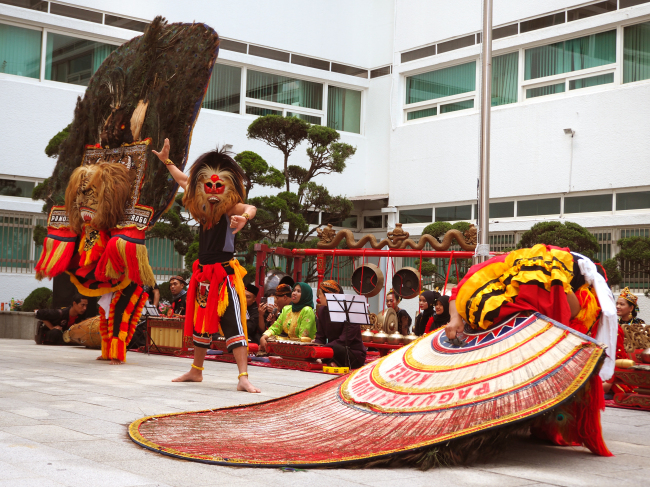
“Indonesian is a relatively easy language to learn, because it uses an alphabet and its pronunciation is similar to English. The grammar is simple with no past, present and future tense,” Jun Hyo-bin, who studied in the city of Solo for a year through Darmasiswa, told The Korea Herald. “I went to Indonesia because it is a growing country with many possibilities. The market is still unpenetrated in many ways, and people love Korea thanks to the ‘Hallyu Korean Wave’ boom.”
The one-year scholarship -- covering all the costs of education, housing and food -- is organized by Indonesia’s Ministry of National Education in partnership with the Department of Foreign Affairs, and has been offered to foreign students from countries with diplomatic ties to Indonesia since 1974. Students learn about the Southeast Asian country’s diverse cultures and language, encompassing art, music, dance, cuisine, philosophy and more.
Twenty-eight Korean students were selected from a pool of about 100 applicants for the 2017-18 program, and have started their education at leading universities in and around Jakarta, Surabaya, Bandung, Malang, Medan and Aceh, among others.
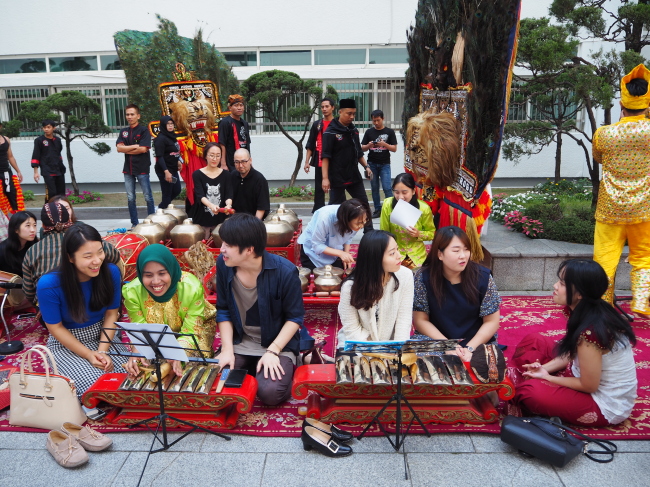
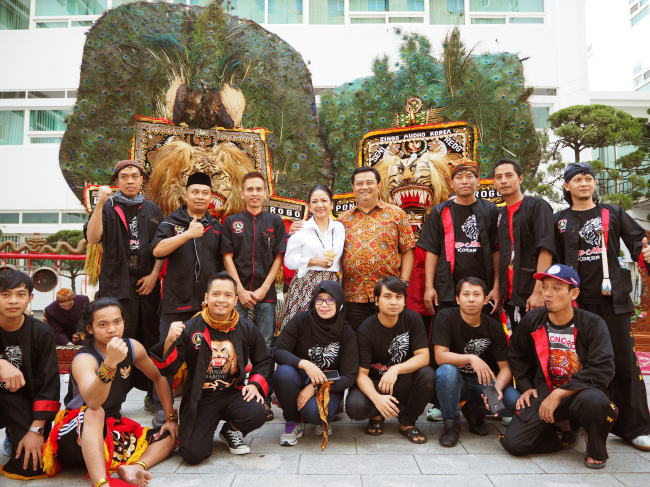
For those interested in experiencing Indonesia through the scholarship, Jun advised them to “live like locals, riding motorcycles, eating on the streets and rubbing shoulders with the natives.”
“Although Indonesians and people of Southeast Asia are passionate about Korea largely through our pop culture, our understanding of their cultures is skin-deep and shallow,” she said. “Koreans make up the largest foreign community in Indonesia. But if you go there without any preparation, the chance of failure in business is high. Mastering the language and understanding the culture are crucial.”
By Joel Lee (joel@heraldcorp.com)









![[Today’s K-pop] BTS pop-up event to come to Seoul](http://res.heraldm.com/phpwas/restmb_idxmake.php?idx=644&simg=/content/image/2024/04/17/20240417050734_0.jpg&u=)
![[Graphic News] More Koreans say they plan long-distance trips this year](http://res.heraldm.com/phpwas/restmb_idxmake.php?idx=644&simg=/content/image/2024/04/17/20240417050828_0.gif&u=)






![[KH Explains] Hyundai's full hybrid edge to pay off amid slow transition to pure EVs](http://res.heraldm.com/phpwas/restmb_idxmake.php?idx=652&simg=/content/image/2024/04/18/20240418050645_0.jpg&u=20240419100350)

